Manan Dey
MMTEB: Massive Multilingual Text Embedding Benchmark
Feb 19, 2025Abstract:Text embeddings are typically evaluated on a limited set of tasks, which are constrained by language, domain, and task diversity. To address these limitations and provide a more comprehensive evaluation, we introduce the Massive Multilingual Text Embedding Benchmark (MMTEB) - a large-scale, community-driven expansion of MTEB, covering over 500 quality-controlled evaluation tasks across 250+ languages. MMTEB includes a diverse set of challenging, novel tasks such as instruction following, long-document retrieval, and code retrieval, representing the largest multilingual collection of evaluation tasks for embedding models to date. Using this collection, we develop several highly multilingual benchmarks, which we use to evaluate a representative set of models. We find that while large language models (LLMs) with billions of parameters can achieve state-of-the-art performance on certain language subsets and task categories, the best-performing publicly available model is multilingual-e5-large-instruct with only 560 million parameters. To facilitate accessibility and reduce computational cost, we introduce a novel downsampling method based on inter-task correlation, ensuring a diverse selection while preserving relative model rankings. Furthermore, we optimize tasks such as retrieval by sampling hard negatives, creating smaller but effective splits. These optimizations allow us to introduce benchmarks that drastically reduce computational demands. For instance, our newly introduced zero-shot English benchmark maintains a ranking order similar to the full-scale version but at a fraction of the computational cost.
StructTest: Benchmarking LLMs' Reasoning through Compositional Structured Outputs
Dec 23, 2024



Abstract:The rapid development of large language models (LLMs) necessitates robust, unbiased, and scalable methods for evaluating their capabilities. However, human annotations are expensive to scale, model-based evaluations are prone to biases in answer style, while target-answer-based benchmarks are vulnerable to data contamination and cheating. To address these limitations, we propose StructTest, a novel benchmark that evaluates LLMs on their ability to produce compositionally specified structured outputs as an unbiased, cheap-to-run and difficult-to-cheat measure. The evaluation is done deterministically by a rule-based evaluator, which can be easily extended to new tasks. By testing structured outputs across diverse task domains -- including Summarization, Code, HTML and Math -- we demonstrate that StructTest serves as a good proxy for general reasoning abilities, as producing structured outputs often requires internal logical reasoning. We believe that StructTest offers a critical, complementary approach to objective and robust model evaluation.
Bridging the Data Provenance Gap Across Text, Speech and Video
Dec 19, 2024



Abstract:Progress in AI is driven largely by the scale and quality of training data. Despite this, there is a deficit of empirical analysis examining the attributes of well-established datasets beyond text. In this work we conduct the largest and first-of-its-kind longitudinal audit across modalities--popular text, speech, and video datasets--from their detailed sourcing trends and use restrictions to their geographical and linguistic representation. Our manual analysis covers nearly 4000 public datasets between 1990-2024, spanning 608 languages, 798 sources, 659 organizations, and 67 countries. We find that multimodal machine learning applications have overwhelmingly turned to web-crawled, synthetic, and social media platforms, such as YouTube, for their training sets, eclipsing all other sources since 2019. Secondly, tracing the chain of dataset derivations we find that while less than 33% of datasets are restrictively licensed, over 80% of the source content in widely-used text, speech, and video datasets, carry non-commercial restrictions. Finally, counter to the rising number of languages and geographies represented in public AI training datasets, our audit demonstrates measures of relative geographical and multilingual representation have failed to significantly improve their coverage since 2013. We believe the breadth of our audit enables us to empirically examine trends in data sourcing, restrictions, and Western-centricity at an ecosystem-level, and that visibility into these questions are essential to progress in responsible AI. As a contribution to ongoing improvements in dataset transparency and responsible use, we release our entire multimodal audit, allowing practitioners to trace data provenance across text, speech, and video.
Consent in Crisis: The Rapid Decline of the AI Data Commons
Jul 24, 2024


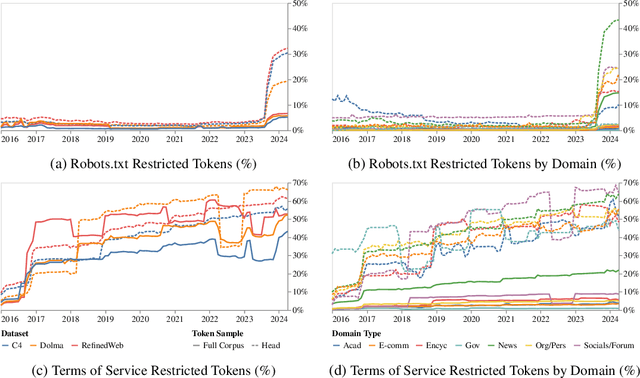
Abstract:General-purpose artificial intelligence (AI) systems are built on massive swathes of public web data, assembled into corpora such as C4, RefinedWeb, and Dolma. To our knowledge, we conduct the first, large-scale, longitudinal audit of the consent protocols for the web domains underlying AI training corpora. Our audit of 14,000 web domains provides an expansive view of crawlable web data and how codified data use preferences are changing over time. We observe a proliferation of AI-specific clauses to limit use, acute differences in restrictions on AI developers, as well as general inconsistencies between websites' expressed intentions in their Terms of Service and their robots.txt. We diagnose these as symptoms of ineffective web protocols, not designed to cope with the widespread re-purposing of the internet for AI. Our longitudinal analyses show that in a single year (2023-2024) there has been a rapid crescendo of data restrictions from web sources, rendering ~5%+ of all tokens in C4, or 28%+ of the most actively maintained, critical sources in C4, fully restricted from use. For Terms of Service crawling restrictions, a full 45% of C4 is now restricted. If respected or enforced, these restrictions are rapidly biasing the diversity, freshness, and scaling laws for general-purpose AI systems. We hope to illustrate the emerging crises in data consent, for both developers and creators. The foreclosure of much of the open web will impact not only commercial AI, but also non-commercial AI and academic research.
StarCoder 2 and The Stack v2: The Next Generation
Feb 29, 2024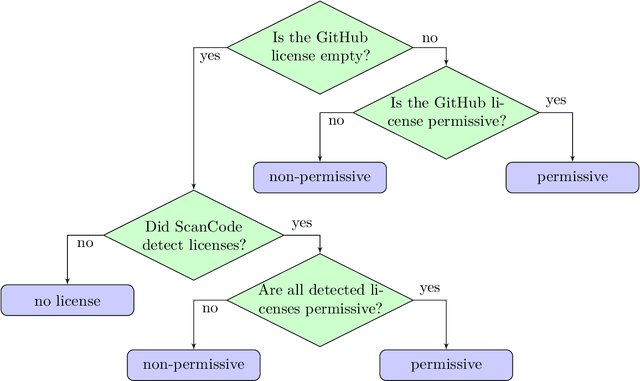
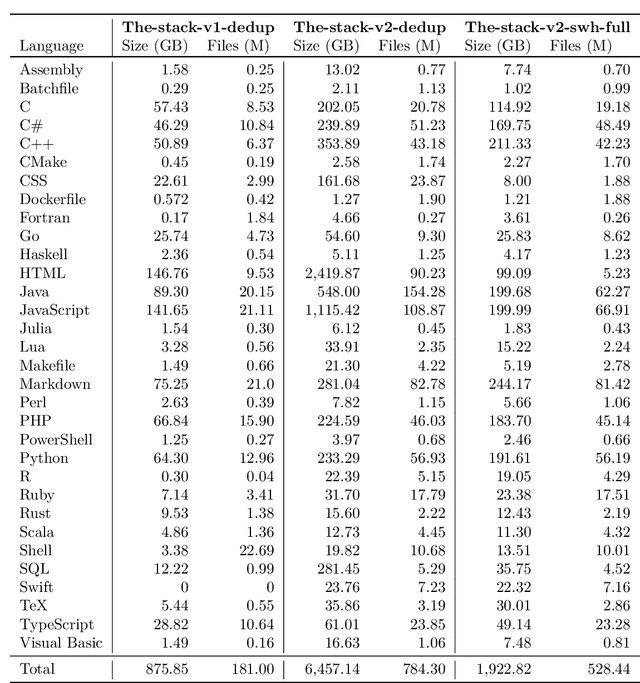
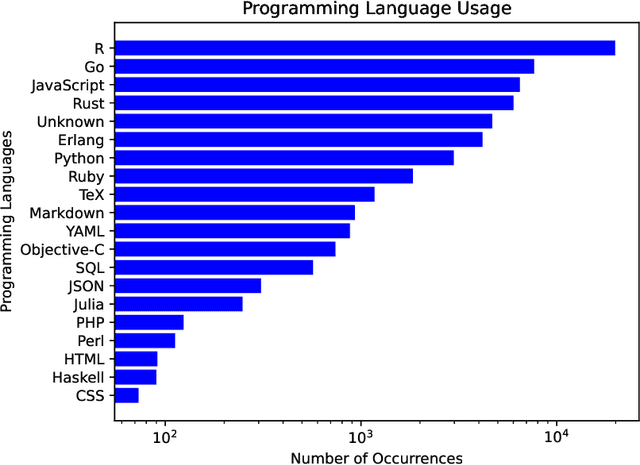
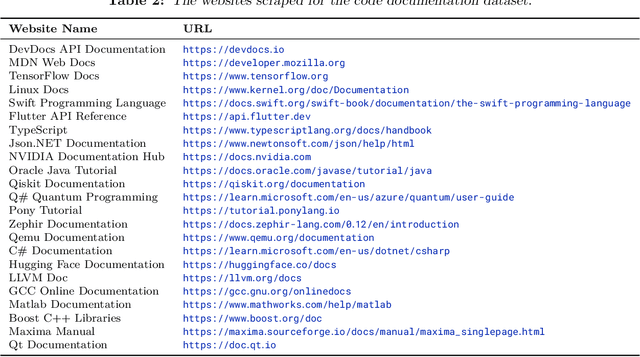
Abstract:The BigCode project, an open-scientific collaboration focused on the responsible development of Large Language Models for Code (Code LLMs), introduces StarCoder2. In partnership with Software Heritage (SWH), we build The Stack v2 on top of the digital commons of their source code archive. Alongside the SWH repositories spanning 619 programming languages, we carefully select other high-quality data sources, such as GitHub pull requests, Kaggle notebooks, and code documentation. This results in a training set that is 4x larger than the first StarCoder dataset. We train StarCoder2 models with 3B, 7B, and 15B parameters on 3.3 to 4.3 trillion tokens and thoroughly evaluate them on a comprehensive set of Code LLM benchmarks. We find that our small model, StarCoder2-3B, outperforms other Code LLMs of similar size on most benchmarks, and also outperforms StarCoderBase-15B. Our large model, StarCoder2- 15B, significantly outperforms other models of comparable size. In addition, it matches or outperforms CodeLlama-34B, a model more than twice its size. Although DeepSeekCoder- 33B is the best-performing model at code completion for high-resource languages, we find that StarCoder2-15B outperforms it on math and code reasoning benchmarks, as well as several low-resource languages. We make the model weights available under an OpenRAIL license and ensure full transparency regarding the training data by releasing the SoftWare Heritage persistent IDentifiers (SWHIDs) of the source code data.
StarCoder: may the source be with you!
May 09, 2023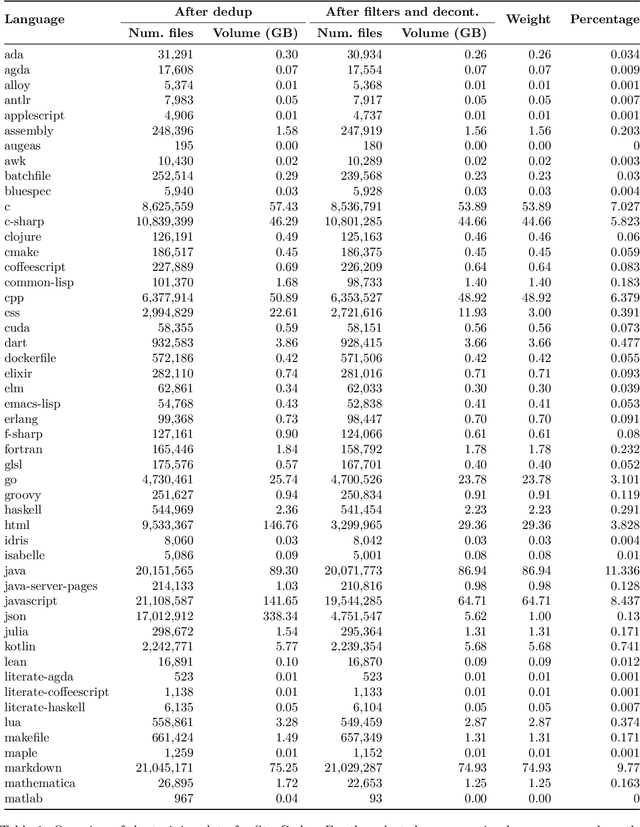
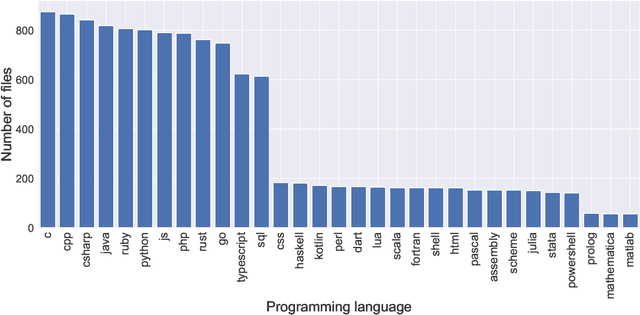
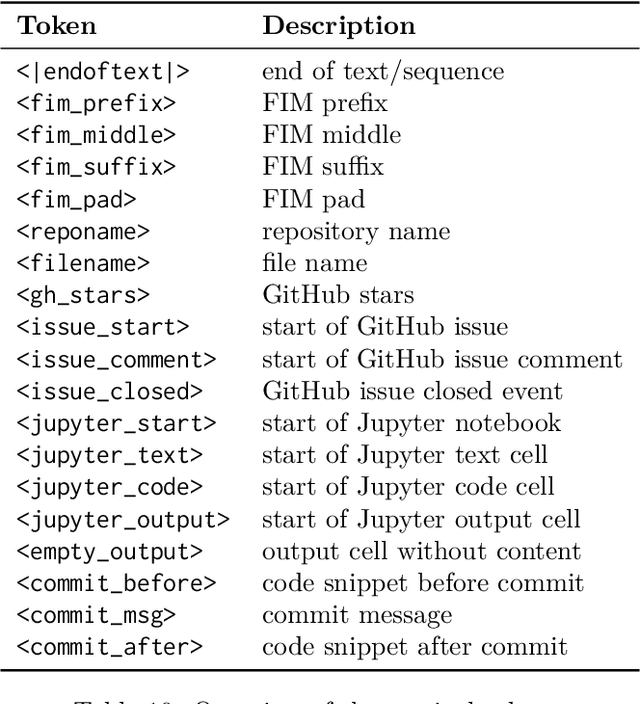
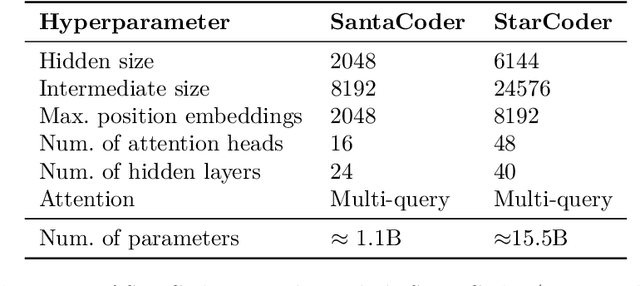
Abstract:The BigCode community, an open-scientific collaboration working on the responsible development of Large Language Models for Code (Code LLMs), introduces StarCoder and StarCoderBase: 15.5B parameter models with 8K context length, infilling capabilities and fast large-batch inference enabled by multi-query attention. StarCoderBase is trained on 1 trillion tokens sourced from The Stack, a large collection of permissively licensed GitHub repositories with inspection tools and an opt-out process. We fine-tuned StarCoderBase on 35B Python tokens, resulting in the creation of StarCoder. We perform the most comprehensive evaluation of Code LLMs to date and show that StarCoderBase outperforms every open Code LLM that supports multiple programming languages and matches or outperforms the OpenAI code-cushman-001 model. Furthermore, StarCoder outperforms every model that is fine-tuned on Python, can be prompted to achieve 40\% pass@1 on HumanEval, and still retains its performance on other programming languages. We take several important steps towards a safe open-access model release, including an improved PII redaction pipeline and a novel attribution tracing tool, and make the StarCoder models publicly available under a more commercially viable version of the Open Responsible AI Model license.
The BigScience ROOTS Corpus: A 1.6TB Composite Multilingual Dataset
Mar 07, 2023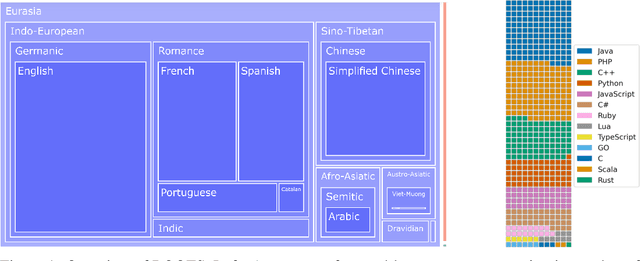



Abstract:As language models grow ever larger, the need for large-scale high-quality text datasets has never been more pressing, especially in multilingual settings. The BigScience workshop, a 1-year international and multidisciplinary initiative, was formed with the goal of researching and training large language models as a values-driven undertaking, putting issues of ethics, harm, and governance in the foreground. This paper documents the data creation and curation efforts undertaken by BigScience to assemble the Responsible Open-science Open-collaboration Text Sources (ROOTS) corpus, a 1.6TB dataset spanning 59 languages that was used to train the 176-billion-parameter BigScience Large Open-science Open-access Multilingual (BLOOM) language model. We further release a large initial subset of the corpus and analyses thereof, and hope to empower large-scale monolingual and multilingual modeling projects with both the data and the processing tools, as well as stimulate research around this large multilingual corpus.
SantaCoder: don't reach for the stars!
Jan 09, 2023



Abstract:The BigCode project is an open-scientific collaboration working on the responsible development of large language models for code. This tech report describes the progress of the collaboration until December 2022, outlining the current state of the Personally Identifiable Information (PII) redaction pipeline, the experiments conducted to de-risk the model architecture, and the experiments investigating better preprocessing methods for the training data. We train 1.1B parameter models on the Java, JavaScript, and Python subsets of The Stack and evaluate them on the MultiPL-E text-to-code benchmark. We find that more aggressive filtering of near-duplicates can further boost performance and, surprisingly, that selecting files from repositories with 5+ GitHub stars deteriorates performance significantly. Our best model outperforms previous open-source multilingual code generation models (InCoder-6.7B and CodeGen-Multi-2.7B) in both left-to-right generation and infilling on the Java, JavaScript, and Python portions of MultiPL-E, despite being a substantially smaller model. All models are released under an OpenRAIL license at https://hf.co/bigcode.
BLOOM: A 176B-Parameter Open-Access Multilingual Language Model
Nov 09, 2022Abstract:Large language models (LLMs) have been shown to be able to perform new tasks based on a few demonstrations or natural language instructions. While these capabilities have led to widespread adoption, most LLMs are developed by resource-rich organizations and are frequently kept from the public. As a step towards democratizing this powerful technology, we present BLOOM, a 176B-parameter open-access language model designed and built thanks to a collaboration of hundreds of researchers. BLOOM is a decoder-only Transformer language model that was trained on the ROOTS corpus, a dataset comprising hundreds of sources in 46 natural and 13 programming languages (59 in total). We find that BLOOM achieves competitive performance on a wide variety of benchmarks, with stronger results after undergoing multitask prompted finetuning. To facilitate future research and applications using LLMs, we publicly release our models and code under the Responsible AI License.
How sensitive are translation systems to extra contexts? Mitigating gender bias in Neural Machine Translation models through relevant contexts
May 22, 2022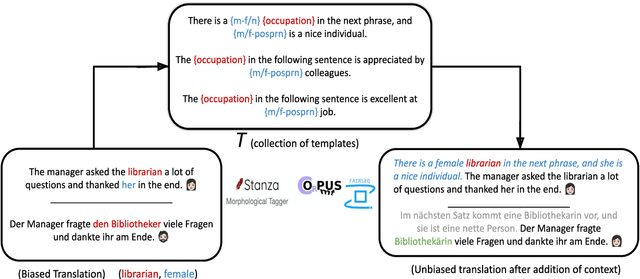
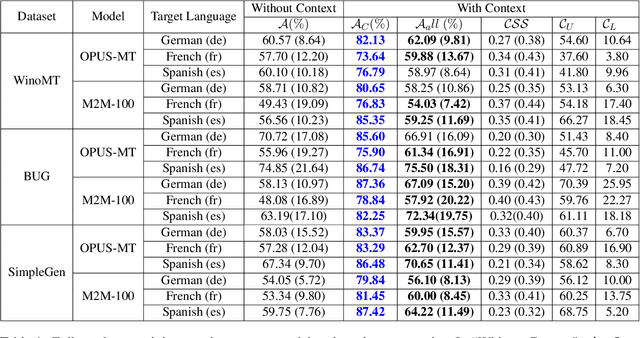

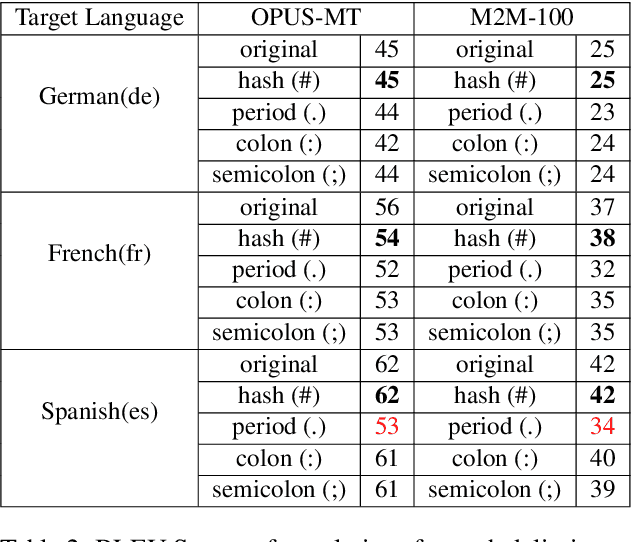
Abstract:Neural Machine Translation systems built on top of Transformer-based architectures are routinely improving the state-of-the-art in translation quality according to word-overlap metrics. However, a growing number of studies also highlight the inherent gender bias that these models incorporate during training, which reflects poorly in their translations. In this work, we investigate whether these models can be instructed to fix their bias during inference using targeted, guided instructions as contexts. By translating relevant contextual sentences during inference along with the input, we observe large improvements in reducing the gender bias in translations, across three popular test suites (WinoMT, BUG, SimpleGen). We further propose a novel metric to assess several large pretrained models (OPUS-MT, M2M-100) on their sensitivity towards using contexts during translation to correct their biases. Our approach requires no fine-tuning, and thus can be used easily in production systems to de-bias translations from stereotypical gender-occupation bias. We hope our method, along with our metric, can be used to build better, bias-free translation systems.
 Add to Chrome
Add to Chrome Add to Firefox
Add to Firefox Add to Edge
Add to Edge